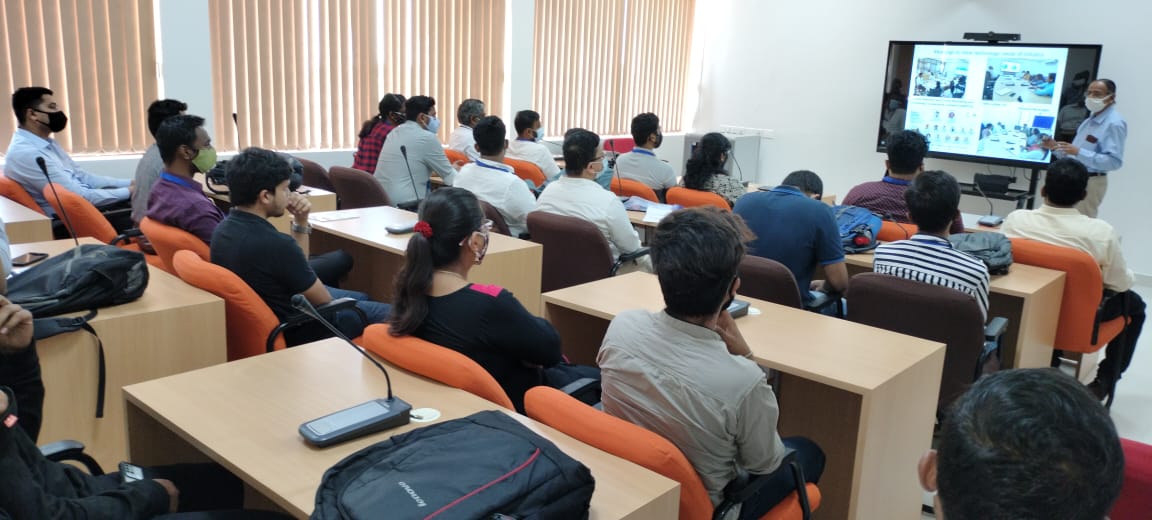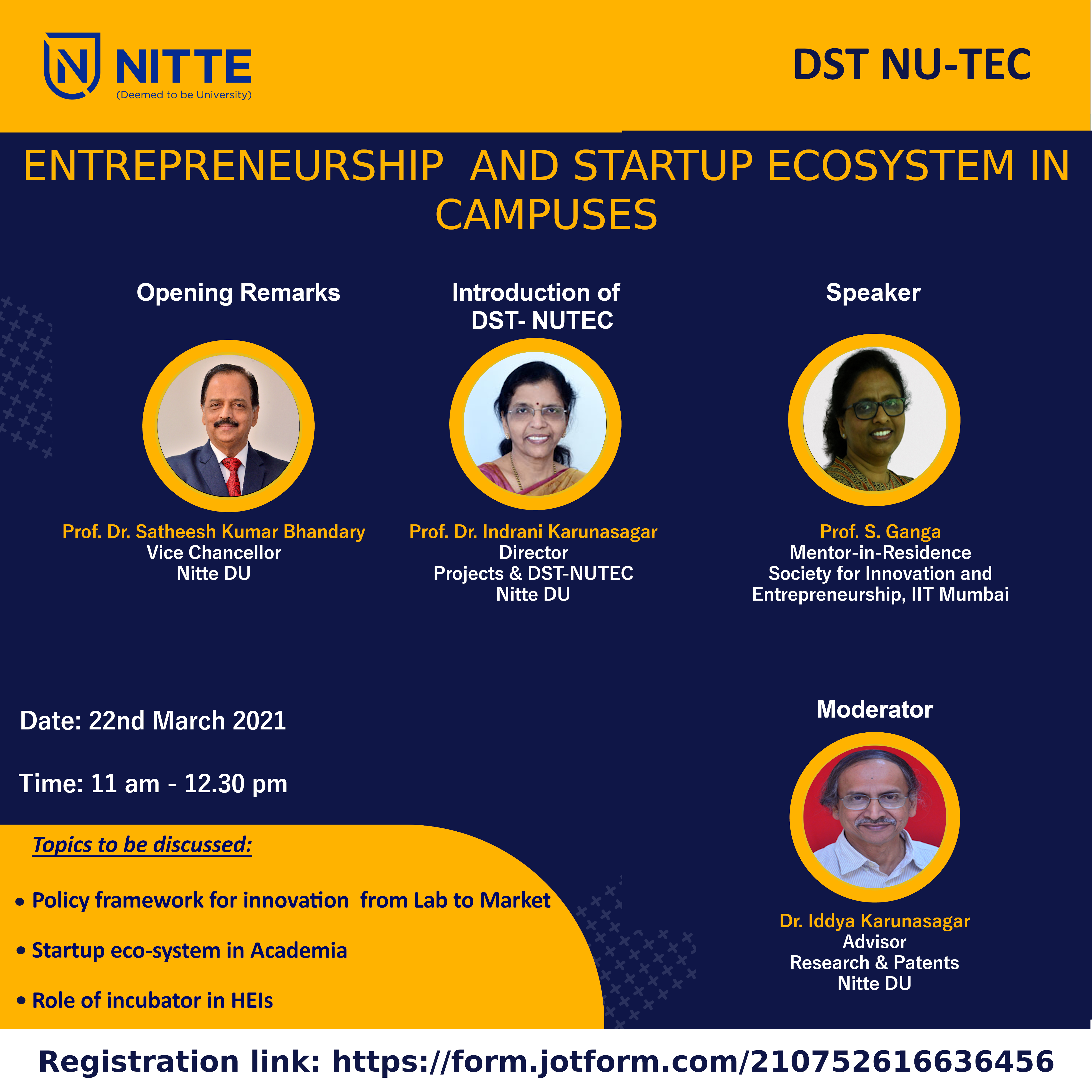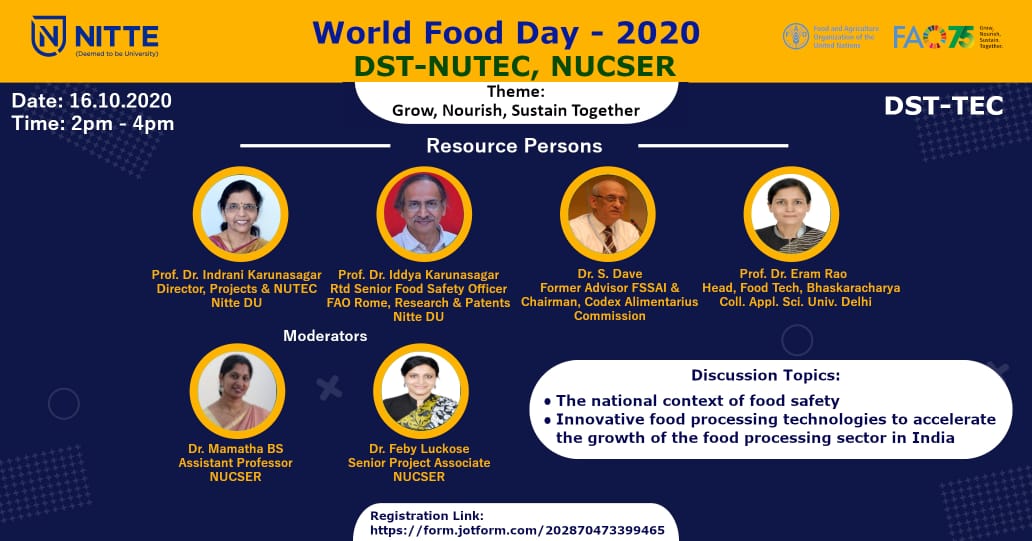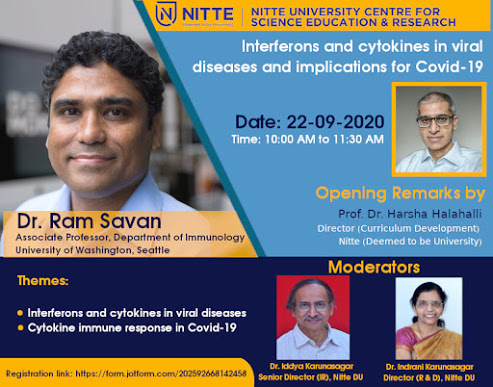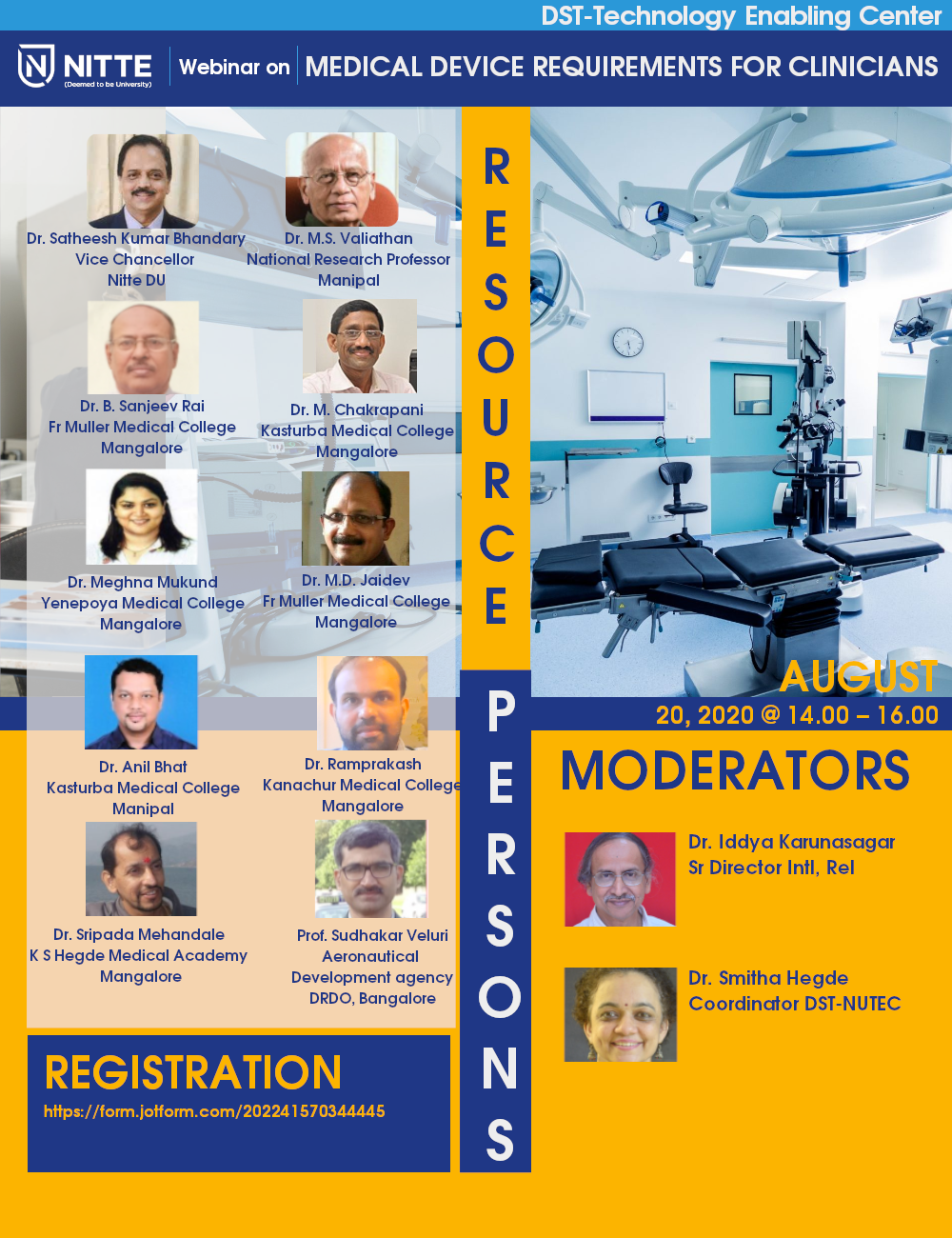Medical device requirements for clinicians
Date : 2020-08-20
The Atmanirbhar scheme of the government prompted the DST NU-TEC to organize a webinar on “Medical device requirements for clinicians” on August 20, 2020. The objective of the webinar was to have first-hand knowledge of the requirement of medical devices for further development and commercialization of technologies. As a first step the DST NU-TEC brought together academicians and clinicians on a single platform to have the needs spelt out. Medical professionals from various institutions invited for the webinar included Dr B Sanjeev Rai, Father Muller’s Medical College, Dr M Chakrapani, Kasturba Medical College, Mangaluru, Dr Meghna Mukund, Yenepoya Medical College, Dr Anil Bhat, Kasturba Medical College, Manipal, Dr M.D Jaidev, Father Muller Medical College, Dr Ramaprakash, Kanachur Medical College and Dr Sripada Mehandale, K S Hegde Medical Academy. The need for this webinar was explained by Dr Iddya Karunasagar, Advisor, who stressed the importance of research in developing medical devices for improved health care delivery that would become affordable without the quality being compromised.
“There is a need for the development of paper strip for urine analysis, assessing liver function, spot test for analysing nasal swab to detect covid-19, microfluidic devices for the infectious disease, chip based microfluidic device for the detection of lithium, wristband for real time detection of glucose, sodium, chloride etc. Sweat monitoring patch for sweat rate, chloride and temperature, handheld optical tomography (OCT), LED based fluorescence microscope, innovation in the field of nano-materials, nano-medicine, nano-fibers theranostics, micro-nano electronic devices, biosensors, micro-needles and smart phone assisted device prediction model with artificial intelligence for a rapid progress in the field of medicine”
- Dr B Sanjeev Rai
Father Muller Medical College
“There should be a collaboration between the health care officials and the technical stream for the identification of various health care needs. A fusion of e-stethoscope, pulse-oximeter, BP, ECG, Infrared thermometer, glucometer would be a great all-in-one doctors instrument. Non-invasive glucose measurement system, thermal mapping and correlation with diseases, artificial intelligence and body signals to develop instruments in context with disease identification such as JVP, PFT and phonocardiogram, slide scanners with digital scanning, simple continuous EEG monitoring, mobile device including infrared thermometer, logistics in the area of patient transport, patient management system tablet identification, remote monitoring patient safety issues, imaging through Ryles tube, lensless microscope, quick digital scanning sharper ECG using fine small needle electrode, nano-drop sampling are few areas that requires research attention”
- Dr M Chakrapani
Kasturba Medical College
“There is a need for cost effective nasal prongs and tubing’s for heated humidified high flow, adrenaline auto injectors, development of model to accurately predict acute attack of asthma using analytical/physiological factors integrated with machine learning algorithms.”
- Dr M D Jaidev
Father Muller Medical College
“Medical innovation is required in the field of tissue culture, plastic surgery, 3D bio-printing, 3D organ development, microfluidics, nano biotechnology, recombinant therapeutics, API formulations, fabrication devices, low cost glucose monitoring and GI cancer detection system, precision medicine, medical robotics, advances in sensors, orthopedic devices such as 3D printed implants/prosthesis, low cost phono-cardiograph, tracheostomy tubes, affordable smart walker, body scanner, gait analysis lab, industrial machining tools, polymer casting, vacuum molding”
- Dr Anil Bhat
Kasturba Medical College
“There is a need for having simplified yet protective PPE to prevent fogging and heat generation in PPE, assistance to cannulate the vein in infants, automation in patient transfer facility, device to monitor the oxygen delivery, diaper to recognize wetting and bedsore, device to diagnose sleep apnea, device for chest physiotherapy, distance sensor to increase the accuracy of thermo-scanners, digital radiograpghy, no contact stethoscope, positioning device in OT to perform oro-nasal surgery and a cost effective micro-debrider”
- Dr Sripada Mehandale
K S Hegde Medical Academy
“There is a requirement of wheel chair with voice enabled RFID device for opening locked doors, osteoporotic assisted device, C arm capable of taking views of both antero-posterior and lateral shots without having to move C arm position. Devices such as spectacle with coring gorilla glass, sensors on the spectacles which will prompt the patient about topography of the surrounding, slit lamp supported on drone for the ophthalmological examination, user friendly affordable light weight digital device to monitor eye pressure, simulation device with good haptic feedback for cataract surgery, use of artificial intelligence to examine retina, wireless hassle free multi parameter monitor for operation theatres and ICUs, robotic assisted physiotherapy, swivel chair and accessories in ambulance to transport the patients with breathlessness, caulking gun with autologous for fat transplantation and bar code with audio prompt on medicine vials to minimize human errors are few requirements the clinicians are looking forward to.”
- Dr Meghna Mukund
Yenepoya Medical College
“Making technology available to rural area in low resource setting and having tele ICU facility and smart clinics is as important as developing new techniques. Few basic mandatory devices required are wireless vital sign patch monitors, wearable electrocardiogram patches, AED, pulse-oximeter, oxygen concentrator, home BIPAP, dialysis machines, CT scan, self-testing (GRBS), ECG/USG machine, plates and screws, bone wires, orthopedic implants in the remote areas at low cost. There is also a need for having artificial intelligence medical device to screen diabetic retinopathy, ambulatory glucose profile, triage tool for the radiology image, human-AI interaction in robotic surgery, health information registry and trauma registry”
- Dr Ramaprakash
Kanachur Medical College
Last updated
2021-02-13 04:45:09
